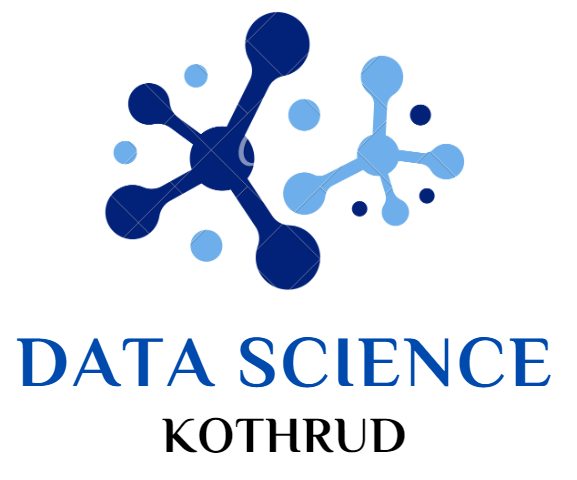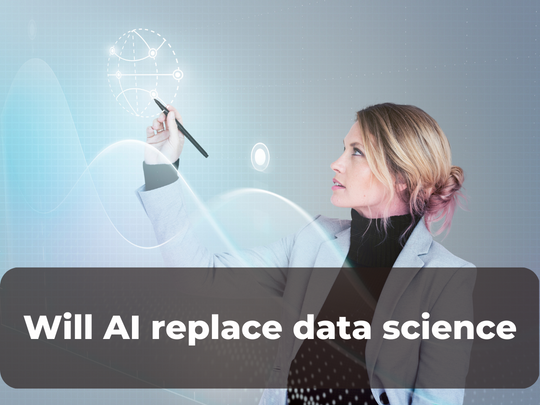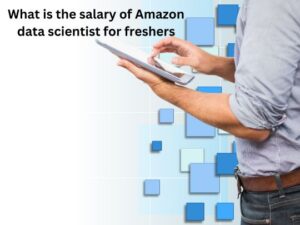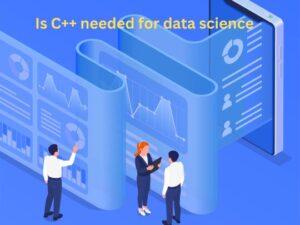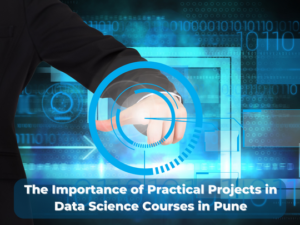With data generation, data science has grown. Today, we track so much data every day, so we need more data scientists and more. Data science is on a fast track and evolving, improving daily. AI is also developing, and a lot of changes are happening. Machines have become autonomous and smarter by the day.
At first, most people thought that we had the victory because machines would be able to assist us in jobs that are process hungry. Still, then, it became a threat when there was a possibility that AI would take up human jobs and replace some of the titles that earn us a living.
Looking forward to becoming a Data Scientist? Check out the Data Science Course With Placement and get certified today.
This threat is also helpful in data science, which is at the top of the tier. Many data scientists and others aspiring to enter the field are worried that data collection and processing may be automated through AI.
AI has great potential to handle tasks we attribute to data scientists, like data analytics and data collection. However, some other factors are missing. Therefore, it is important to explore all possibilities to establish whether it is indeed possible for AI to replace data science.
Will AI replace data science?
To help answer this question, we need to segregate the jobs under data science. This is a broad field with many jobs, ranging from ML solution building and data analytics. The main categories are:
Data engineering:
data engineers are responsible for collecting data and handling operations like cleaning data and operations in formats that can be used for more analysis.Data scientists:
these are professionals that handle data processed by engineers. They do preparatory analysis and develop models that can help solve different solutions.
The roles played by data engineers are under threat, and most of them can be overtaken by AI. However, for data scientists, the damage is not that significant soon. Some of the roles that could be automated include:
Variation generation for some models
Detecting trends within data
Automatic model deployment once ready
Data cleaning and delivery, whether and when needed
Data collection and combination from different sources
Even though there are significant tasks under data engineers that are already automated or in the process of being automated, we still need data engineers in human form. This is because we cannot automate all tasks, especially some core tasks like:
Managing data core infrastructure
Creating non-SQL pipelines
Data support and optimization
When computers were introduced, there was a fear that they would end up replacing is in job settings. However, in the end, they became more helpful in achieving new heights. While some job subsets were taken over, more were created. New opportunities emerged with the introduction of computers. This simply tells us we should not worry about losing our jobs to AI. It could be the tool to help us do better in our jobs and could lead to more opportunities in the coming days.
Why AI cannot replace data scientists
With the above sentiments, we can clearly say data science is in a safe zone and cannot be replaced by AI. This is because machines cannot replace some parts of data science at all, regardless of how smart they have become.
Today, even complex games that need strategies and quick reactions can be handled by AI. But this is not the case with data science.
In data science, professionals keep on facing fresh scenarios
Data engineers come across similar data sets now and then. For them, it is about gathering information from different sources, cleaning the data, and storing it. Data scientists have versatile jobs in comparison. They need to handle new tasks under different scenarios every day. It is not common for them to handle the same thing repeatedly.
AI cannot match this. AI needs training in a particular job. When a given level of accuracy is achieved, the AI is allowed to handle that job. Regardless of how good it is, AI cannot figure out new complexities.
No machine has intuition.
We can all agree that AI systems are intelligent and get smarter daily. However, this is a computer in every way. The most brilliant AI cannot be closely compared to a human, even with a low IQ. AI cannot be compared to the human brain. They rely on the things humans have trained them on and the data they have been fed.
In data science, there are instances where intuition is needed to handle things. For example, you may have data, but it may be accurate. In such a case, you must use common sense to make things sensible. There have been attempts to create computers to be as close to human common senses as possible, but that is still a work in progress. There is much work to be done, and it may still be too far conceived.
360DigiTMG offers a full time data science course in Pune to start a career in Data Science. Enroll now!
AI bears no soft skills.
AI can handle many technical skills, and in truth, these are some areas that it has taken in parts of data science. However, we must appreciate that data science is about more than just technical skills. There is so much more to it. AI can handle the technical skills needed to develop models but cannot explain how the model can be applied in real-life scenarios. Machines are not in a position to tell us the way a new algorithm affects given scenarios. Machines don’t have soft skills. Regardless of how good AI is, interpersonal skills cannot be replaced.
So, is AI useful for data scientists? The answer is yes. AI can be very helpful to data scientists instead of being simply a threat. Some of the top reasons why it can complement the work of data scientists include:
It saves time handling boring and monotonous tasks
AI helps identify tiny patterns, especially in handling raw data forms and looking for inconsistencies
AI is very accurate, and we cannot beat it in this area
Conclusion
AI is advancing relatively fast, and there has been a shift in how things are done. However, even though many jobs are threatened, some areas cannot be replaced. Data scientists, in particular, need AI to handle some of the boring and monotonous tasks that are highly technical. This is to say, AI can make things easier for a data geneticist and save time. However, as far as the total replacement of data scientists is concerned, we are still very far off because machines don’t have intuition or capacities close to the human brain.
